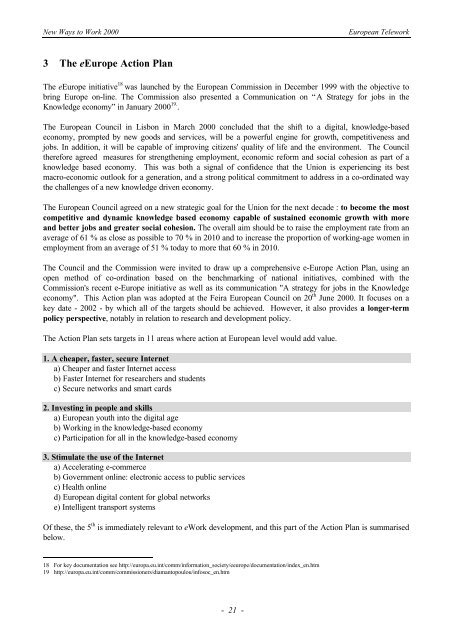eWORK 2000 - European Telework Week
eWORK 2000 - European Telework Week
eWORK 2000 - European Telework Week
- No tags were found...
You also want an ePaper? Increase the reach of your titles
YUMPU automatically turns print PDFs into web optimized ePapers that Google loves.
New Ways to Work <strong>2000</strong><strong>European</strong> <strong>Telework</strong>3 The eEurope Action PlanThe eEurope initiative 18 was launched by the <strong>European</strong> Commission in December 1999 with the objective tobring Europe on-line. The Commission also presented a Communication on “A Strategy for jobs in theKnowledge economy” in January <strong>2000</strong> 19. .The <strong>European</strong> Council in Lisbon in March <strong>2000</strong> concluded that the shift to a digital, knowledge-basedeconomy, prompted by new goods and services, will be a powerful engine for growth, competitiveness andjobs. In addition, it will be capable of improving citizens' quality of life and the environment. The Counciltherefore agreed measures for strengthening employment, economic reform and social cohesion as part of aknowledge based economy. This was both a signal of confidence that the Union is experiencing its bestmacro-economic outlook for a generation, and a strong political commitment to address in a co-ordinated waythe challenges of a new knowledge driven economy.The <strong>European</strong> Council agreed on a new strategic goal for the Union for the next decade : to become the mostcompetitive and dynamic knowledge based economy capable of sustained economic growth with moreand better jobs and greater social cohesion. The overall aim should be to raise the employment rate from anaverage of 61 % as close as possible to 70 % in 2010 and to increase the proportion of working-age women inemployment from an average of 51 % today to more that 60 % in 2010.The Council and the Commission were invited to draw up a comprehensive e-Europe Action Plan, using anopen method of co-ordination based on the benchmarking of national initiatives, combined with theCommission's recent e-Europe initiative as well as its communication "A strategy for jobs in the Knowledgeeconomy". This Action plan was adopted at the Feira <strong>European</strong> Council on 20 th June <strong>2000</strong>. It focuses on akey date - 2002 - by which all of the targets should be achieved. However, it also provides a longer-termpolicy perspective, notably in relation to research and development policy.The Action Plan sets targets in 11 areas where action at <strong>European</strong> level would add value.1. A cheaper, faster, secure Interneta) Cheaper and faster Internet accessb) Faster Internet for researchers and studentsc) Secure networks and smart cards2. Investing in people and skillsa) <strong>European</strong> youth into the digital ageb) Working in the knowledge-based economyc) Participation for all in the knowledge-based economy3. Stimulate the use of the Interneta) Accelerating e-commerceb) Government online: electronic access to public servicesc) Health onlined) <strong>European</strong> digital content for global networkse) Intelligent transport systemsOf these, the 5 th is immediately relevant to eWork development, and this part of the Action Plan is summarisedbelow.18 For key documentation see http://europa.eu.int/comm/information_society/eeurope/documentation/index_en.htm19 http://europa.eu.int/comm/commissioners/diamantopoulou/infosoc_en.htm- 21 -








